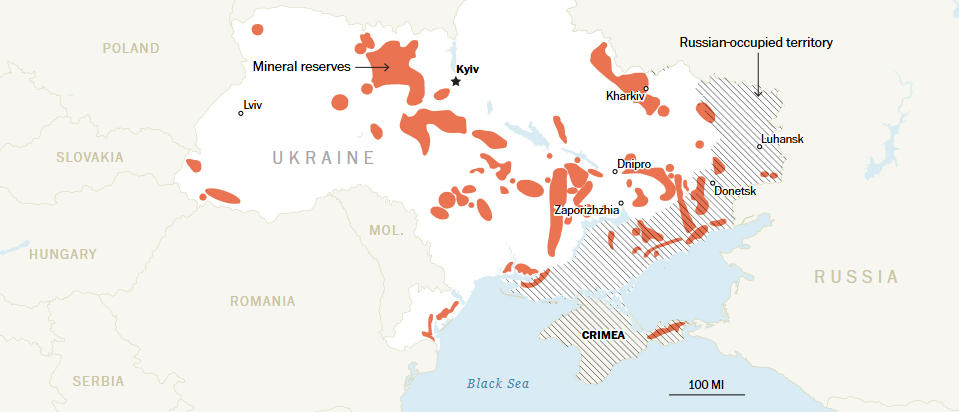19 mins read
Biden Lied About Everything, Including Nuclear Risk, During Ukraine Operation
Sourced to tone-deaf “U.S. officials,” a massive New York Times exposé reveals an unprecedented betrayal of American voters, but also Ukraine
9 mins read

Donald Trump often says that liberating Iraq without getting its oil resources was one of America’s biggest foreign policy blunders. He has a chance to avoid a similar mistake in Ukraine.
Ukraine is not only the breadbasket of Europe; it is also a mineral superpower, with some of the largest reserves of 117 of the 120 most widely used minerals in the world. Of the 50 strategic minerals identified by the United States as critical to its economy and national security, many of which are quite rare yet key to certain high-value applications, Ukraine supplies 22.
Ukraine possesses the largest reserves of uranium in Europe; the second-largest reserves of iron ore, titanium and manganese; and the third-largest reserves of shale gas — as well as large deposits of lithium, graphite and rare earth metals, according to a 2022 report by the Canadian geopolitical risk-analysis firm SecDev. These minerals are essential to the production of vital goods ranging from airplanes, cellphones and electric vehicles to steel and nuclear power.
The question for the president-elect is: Does he want Russia and China to get that treasure trove of natural resources? Or does he want to develop them with Ukraine to the benefit of the American people?
One of the main reasons Russian President Vladimir Putin invaded Ukraine (aside from his delusional historical fantasies about how Ukrainians and Russians are “one people”) was to seize these natural resources, which are valued at an estimated $26 trillion, according to SecDev.
That effort nearly succeeded. In early 2022, Russian forces reached the outskirts of Kyiv and came close to taking the capital and installing a puppet regime. But with U.S. assistance — including the Javelin missiles that Trump supplied (reversing Barack Obama’s lethal weapons ban) — Ukraine forced Russia back. In so doing, it not only liberated its citizens from brutal Russian occupation but also successfully defended roughly 80 percent of Ukraine’s known mineral deposits, according to the SecDev report — including 73 percent of its iron ore, 75 percent of its lithium and graphite, 90 percent of its titanium, and 92 percent of its uranium and other radioactive elements.
Early on, Russia seized control of an estimated 80 percent of Ukraine’s massive offshore hydrocarbon deposits. But over the past three years, Ukraine has wiped out roughly half of Russia’s Black Sea Fleet using explosive sea drones to drive the Russian navy from its territorial waters. With that successful offensive, Ukraine has reopened its shipping lanes and recaptured many of its Black Sea oil and gas deposits.
Today, Ukraine maintains control of 96.5 percent of its proven oil reserves and 96 percent of its proven natural gas reserves — as well as all of its aluminum, cobalt, copper, nickel, tin and beryllium deposits.

Russia did succeed in seizing about 57 percent of the country’s known coal reserves (worth about $11.9 trillion) and about half of its deposits of certain rare earths (though many of those were captured in 2014 when Russia first invaded and seized Crimea). But those losses notwithstanding, Ukraine has prevented Russia from seizing $13.6 trillion in mineral and hydrocarbon wealth.
That has been a massive defeat for Putin — and a huge opportunity for the United States.
The American people have already invested about $183 billion to help Ukraine defend its mineral-rich land from Russian aggression. Though the vast majority of the military portion of that aid has been spent here in the United States — strengthening our defense production capacity and creating good manufacturing jobs for American workers — that amount remains a staggeringly large investment in helping Ukraine defend itself from unjust aggression. Shouldn’t U.S. taxpayers get a return on that investment? Do we want Ukrainian titanium going into American planes, or into Russian and Chinese fighter jets that will threaten the United States and its allies? Do we want Ukraine’s lithium and rare earths powering American-made electronics and electric vehicles, or Chinese ones?
Trump has pledged to “bring Americans the lowest-cost energy and electricity on Earth” as well as expand artificial intelligence and cryptocurrency mining, which require data centers that consume vast amounts of electricity. The only proven way to lower electricity costs while simultaneously increasing electricity demand is to dramatically boost our supply of clean nuclear power. And Trump has pledged to approve the construction of nuclear plants powered by small innovative reactors.
That would dramatically increase U.S. demand for uranium. The United States is already the largest purchaser of Russian-enriched uranium, dependent on Moscow for nearly one-quarter of its supply. It is not in our strategic interest to allow Putin to seize control of the largest uranium reserves in Europe. The United States needs that Ukrainian uranium to lower energy costs for Americans and fuel AI and crypto innovation.
Trump has also set a priority of reducing America’s economic dependence on Communist China. Beijing is the largest source of more than half of the critical minerals the United States imports, including 72 percent of rare earth imports. China is trying to corner the global market on lithium, actively buying mines across the world, as well as mines for other critical minerals, such as cobalt and nickel. And demonstrating its growing power over the U.S. economy, Beijing recently tightened export controls on critical minerals such as aluminum and titanium, banned the export of gallium and severely restricted the export of graphite to the United States. Ukraine has all of these minerals in abundance.
Were Ukraine’s mineral wealth to fall into Russian hands, it would be a strategic and economic boon to China, which has established a “no limits” partnership with Russia. Meanwhile, the United States needs friendly, reliable sources of these critical minerals. If we help Ukraine secure and develop its natural resources, we can also deal a strategic blow to Beijing and Moscow, while bringing enormous financial benefit back to the American people.
But to do so, Ukraine needs Trump’s help to secure a just and lasting peace.
After Russia’s full-scale invasion, metallurgical production in Ukraine fell by an estimated 80 percent — from 20 million tons in 2021 to just 2.5 million by the middle of 2023. It is hard to mine for minerals while missiles are being fired at your critical infrastructure. It is impossible to develop offshore oil and natural gas in the waters Ukraine controls in the North Crimean Basin under the shadow of Russian forces within firing range.

American businesses can develop those resources for the benefit of the American and Ukrainian peoples — but only if the fighting ends on terms that give investors confidence the Russian assault won’t resume.
The reality is that Putin won’t willingly give up on his quest to conquer Ukraine and its mineral wealth. He will violate any international agreement Russia signs to achieve his objective. The only way to stop him is to make his objective impossible to achieve. Putin no doubt hopes to use any cessation of hostilities to pause, reconstitute his forces and resume his invasion in a few years’ time — just like he did after his 2014 invasion and annexation of Crimea.
So, Trump needs to do more than simply stop today’s war in Ukraine; he must create conditions that make a resumption of war impossible.
That will require creating defensible borders. During this year’s CNN presidential debate, Dana Bash asked Trump whether Putin’s demands that Russia “keeps the Ukrainian territory it has already claimed and Ukraine abandons its bid to join NATO” were acceptable to him. Trump responded, “No, they’re not acceptable.” He’s right. A good deal that truly secures Ukraine and its resources requires that Kyiv get back critical areas in Kherson and Zaporizhzhia. It will also need security guarantees backed up with Western military might — whether through NATO membership for Ukraine, serious bilateral security commitments or a demilitarized zone enforced by an international peacekeeping force made up of European, not American, troops. (Poland will soon have the third-largest military in NATO and could lead a European peacekeeping operation.)
But another key to a lasting peace is a well-armed Ukraine, so that Kyiv possesses a military powerful enough to deter Russia. The United States will need to arm Ukraine regardless of what happens at the negotiating table — either to stop Russia from resuming the war once Trump has left office or to force Putin to the negotiating table if he refuses to agree to peace. So we must find mechanisms to increase the flow of U.S. weapons to Kyiv that do not require U.S. taxpayers to bear the cost. One way to do so? Loans backed by Ukraine’s mineral and fossil fuel resources as collateral.
By creating confidence that attracts private investment, a Trump-brokered peace accord will help the United States and Ukraine jointly develop Ukraine’s mineral and hydrocarbon resources, allowing it to provide for its own defense, just as Poland and the Baltic states do today.
A stable, sovereign and prosperous Ukraine will be an essential partner for America in extracting this natural resource wealth. An unstable Ukraine under constant threat from Russia will lead to a resumption of war when Trump leaves office, and ultimately allow Putin to seize that wealth for Russia and China’s benefit.
Who will benefit from Ukraine’s oil, gas and mineral wealth? The choice belongs to Trump.
Marc Thiessen writes a column for The Post on foreign and domestic policy. He is a fellow at the American Enterprise Institute, and the former chief speechwriter for President George W. Bush.